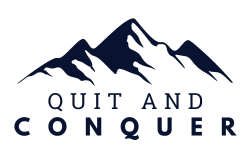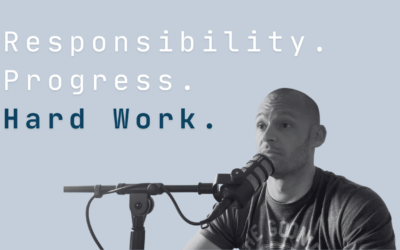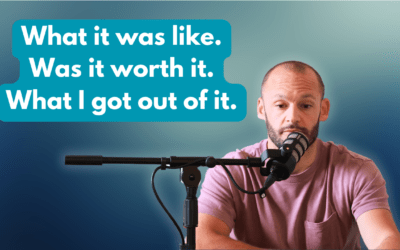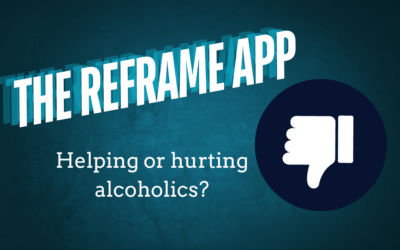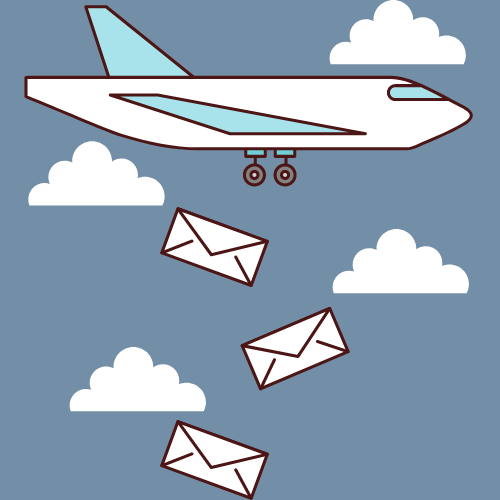I doubt many people who truly commit to getting clean and sober after a long bout of substance abuse think it’s going to be easy. I do think it’s common to enter recovery with a sort of uninformed optimism that causes us to underestimate what will be required of us to change. Within the first few months, there is often a turning point where reality sets in and the fog lifts. Here we discover that there is a long road ahead of us, we’re not always going to feel great about it, and we need a new plan. We knew it was going to be hard – this is what hard feels like.
The truth is, and I’m not going to sugarcoat it, you are likely going to feel uncomfortable being clean and sober for quite some time. You’re not going to know what to do, you’re not going to know where to go, and you’re not going to think this feeling will ever end. The good news is – it does.
This is Phase Two of recovery. This is your unexpected trek through the desert. See it through and I promise that on the other side, you will find what you’re looking for.
What Do We Mean By Phase Two?
Before we begin, I want to clarify a little bit about what I mean when I talk about Phase Two. The period I’m talking about is the early stage of sobriety that comes after your initial withdrawals and detox but before you feel comfortable living life clean and sober.
The length of time we remain in this phase will vary, and later we’ll discuss how long we can expect it to last along with contributing factors, but encountering this stage is often unexpected and brings about feelings of uncertainty and general unease about our recovery. This is when we begin to fully realize the amount of work required to improve ourselves and maintain our sobriety long-term. This is a period of informed pessimism.
But this is also where we slowly begin to rebalance and return to normal. This is where we learn who we truly are when we’re not under the influence of drugs and alcohol. This is where we begin to accept that. This is where we prepare to rebuild our lives.
Beware The Pink Cloud
Pink cloud syndrome is a honeymoon phase common to people in the very early stages of their sobriety and occurs after the initial withdrawals have ended. It is characterized by feelings of euphoria, a heightened sense of optimism, and naive beliefs about what the transition from active addiction to recovery is going to be like.
Why this occurs still isn’t well understood, and many times people compare it to the same high they felt when using drugs and alcohol. Being optimistic about the future and happy to be sober is a good thing in itself, but pink clouding often involves delusional beliefs of always feeling good in recovery and premature claims of success.
When this feeling passes, and it will pass, people often feel discouraged and sometimes even depressed. This is dangerous for people in early stages of sobriety, especially when reality comes crashing down around them. They currently sit atop a shaky foundation and the potential for relapse is high.
While pink cloud syndrome might be unavoidable, simply knowing that it exists and expecting it to end can be extremely beneficial. In this way, people won’t feel as blindsided by the sometimes harsh reality that follows and can see the transition for what it is – just a part of the process and evidence they are making progress.
What To Expect In Phase Two
Experiences at this stage of recovery can vary widely, meaning the best we can do here is make generalizations and discuss feelings commonly encountered. Recovery looks different for everybody, and if you’re currently in the early stages, it’s likely that you won’t identify with everything we discuss here and are also experiencing things we overlook. That’s okay though – just know that given some time and enough perseverance you will make it through.
With that being said, Phase Two can be characterized by long tail withdrawal symptoms, a general feeling of being lost, and uncertainty about the future. In this phase, it is common to wonder when you will start feeling “normal” again. You might feel like you’re just getting by rather than actually living life.
You’ll likely feel like you have to fill up all your free time in order to distract yourself from the thought of using drugs or drinking again. You might not find enjoyment in things that previously interested you, have a hard time staying focused, and have underlying feelings of restlessness.
All of this stems from an uncomfortability with being sober coupled with the fact that, in this early stage of recovery, the brain is still in the process of repairing itself. Living free from active addiction is much like a skill, and at this point we aren’t any good at it – we shouldn’t expect to be any good at it either – we don’t yet have the experience, knowledge, or confidence it requires to feel comfortable being sober. That’s okay though, because we can work on and develop this over time.
Post-Acute Withdrawal Syndrome
If you thought that withdrawal symptoms came to an end after the first couple weeks and your initial detox, we’ve got bad news for you, you aren’t totally out of the woods yet.
Post-acute withdrawal syndrome (PAWS) are symptoms that follow initial detox and can persist anywhere from months to years after getting clean. This is the second phase of withdrawals and although the symptoms are usually less severe, their extended time-horizon can make them difficult to endure.
While acute withdrawals, which is the type most people think of when abruptly quitting an addictive substance, are the result of the body trying to heal itself, post-acute withdrawals are a consequence of the brain trying to rebalance and recalibrate after long-term substance abuse. Some of the most common symptoms of PAWS are:
- Fatigue and low energy
- Lack of focus and an inability to think clearly
- Irritability
- Anxiety
- Depression
- Lack of initiative or drive
- Trouble sleeping
- Cravings
It is important to remember that just like the symptoms caused by our initial detox, those experienced due to post-acute withdrawal syndrome will pass. We should also note that while these uncomfortable side-effects cannot be avoided, they can be effectively managed by talking to therapists/addiction counselors, utilizing support groups, and proper self-care routines. Healthcare providers also have an array of temporary and non-habit forming drugs they can prescribe to help minimize the effects of PAWS and ease the transition into sobriety.
How Long Does Phase Two Last?
This phase of recovery is typically overshadowed by a general uncomfortability living clean and sober and a lingering feeling of being lost. In this phase we often feel like a drug user or drinker who just happens to not be drinking or using drugs – a fish out of water of sorts.
The transition we are looking to make at this stage, and the mindset we want to adopt, is a “this is what we do now” type of mentality when it comes to our recovery. We want to move away from identifying ourselves as a drinker or drug user who abstains from drugs and alcohol and start identifying as a person who does not use drugs or alcohol. The difference might seem subtle, but the distance between these two points is beyond measure.
How long this phase of our recovery lasts is dependent upon a number of factors: what type of drugs we were using, how often we were using them, the length of time of our substance abuse, the amount we were typically using, our general mental state before entering into recovery, and the status of our physical health. The best we can do is give an estimate between 6 months and two years. During this time the lingering symptoms from PAWS will dissipate and we will begin to identify in a way that better aligns with our long-term recovery. We will also begin to plan for the future – a welcome change of pace from just getting by the days, hours, and minutes.
The transition between this and the next phase of our recovery is not something that occurs overnight. Rather, it is a slow and continuous process where each day we make progress, even if we don’t always perceive the headway being made. We can’t promise it will be quick and we can’t promise it will be easy, but we can promise that it’s possible. Thousands, if not millions, of people have done it before, and you are just as capable as them to push forward and see this thing through.
My Personal Experience At This Stage
While I was in rehab they tried making me aware of PAWS and the long road ahead of me before I felt normal again. Honestly though, I ignored a lot of it because I felt pretty good after a month of not drinking and not doing drugs. I assumed it was going to be pretty smooth sailing from there on out.
Even while I went through Phase Two, I wasn’t very cognizant of it. It wasn’t until I had fully gotten through and became comfortable being sober that I was able to look back and reflect on the first year of my recovery and make sense out of it all.
For almost 18 months after I got out of rehab, I still felt like someone who drank heavily and used drugs but just wasn’t anymore. I still identified as the person I was before entering recovery, which made trying to live any other way awkward and incongruent. I felt like an imposter.
I found myself trying to fill every second of my free time just to stay distracted. I would clean my apartment almost every single day, I did laundry way too often, and I became obsessive about fixing little things that bothered me.
I didn’t really know what to do with myself anymore. Everything I did previously involved drinking and many of the things that most people do to enjoy their free time just didn’t interest me. Simple things like watching TV became a source of frustration, I just couldn’t focus. I would flip back from show to show and movie to movie and never finish any of it.
I also slept… a lot. At first I thought it was just my body trying to catch up on sleep after years of deprivation, and some of it probably was, but I constantly found myself closing my eyes on the couch at 8pm in an attempt to knock out just to pass the time.
I was in a constant state of “getting by.” I rarely was able to enjoy the moment and instead felt like I needed to do this thing just so that I could do this other thing just so that I could repeat the process all over again. It was monotonous. I would go to work and just couldn’t wait until it was over. Then I would go home and perform an array of menial tasks and couldn’t wait until I was done with those. Then I would finally lay down on the couch and find myself forcing sleep just to start a new day tomorrow.
Slowly but surely though, things got better. I started gaining new interests and hobbies, I started enjoying being sober, and I began looking towards the future. Much of the time I didn’t even realize the progress I was making, but I kept moving forward. Eventually I picked up my head, looked around, and realized my trek through the desert was over. I had arrived.
Your Trek Through The Desert
At this point in your recovery things can feel overwhelming, like you’re barely hanging on by a thread. It’s like walking through the desert with no end in sight, being swallowed up by a sea of red sand – hot, tired, and wondering what you’re doing here in the first place.
My best advice would be to do whatever you have to do to get through this stage. If you need to start going to bed earlier in order to avoid unwanted late-night cravings – do that. If you find yourself performing menial tasks in all your free time because you don’t know what else to do – do that. If you need to go to multiple meetings a day just to feel at ease – then do that. The important part here is to remain abstinent. Eventually, the uncomfortable feelings will start to wane and you’ll begin feeling more comfortable living life without being under the influence.
There’s a Chinese proverb that says, “To know the road ahead, ask those who are coming back.” This is my attempt to come back and let you know that what lies ahead is worth the travel. This is admittedly a difficult part on the path to recovery, but if you just find a way to push through, on the other side is greatness.
At the end of this road lies the ability to rebuild your life free from the heavy burden of addiction. At the end of this road lies the ability to rise from the depths.
Don’t approach this with the mindset of doing your best, do what is required. Sometimes, your best needs to get better. If you find yourself unable to run, walk. If you can’t walk, crawl. Kick, scream and claw your way through the sand – but by all means, keep moving forward.
